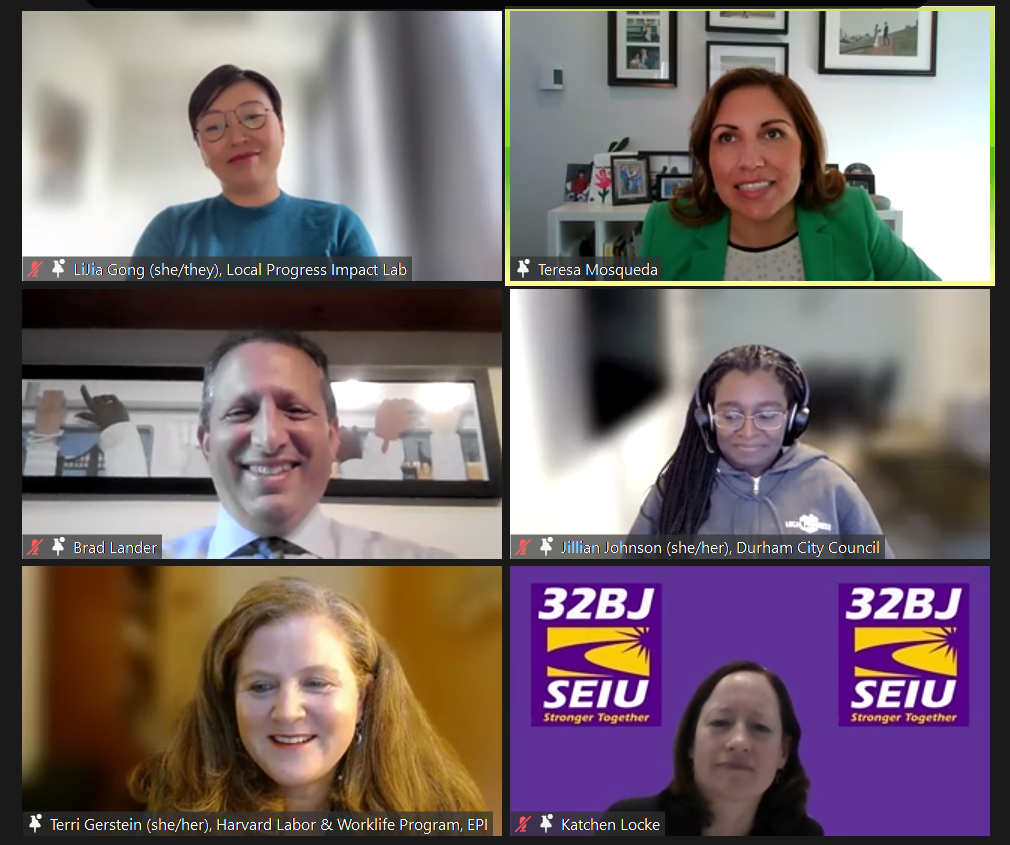The Local Progress Impact Lab and the Harvard Labor and Worklife Program recently convened Local Progress members and unions to discuss how to build worker power at the local level during their webinar “Laboratories of Experimentation: Local Governments at the Forefront of Advancing Workers’ Rights.”
Boston Mayor Michelle Wu provided introductory remarks, referencing some of the innovative workers’ rights policies in her city, including the first ever Worker Empowerment Cabinet that holds oversight of worker safety, workforce development, and worker outreach all in one department. Mayor Wu framed the conversation by asking, “even on challenges that feel national, international or very large in scope, how do we find those kernels that city government can help immediately move on?”
Durham City Council Member Jillian Johnson, Seattle City Council Member Teresa Mosqueda, and New York City Comptroller Brad Lander leaned into tackling this question during a panel discussion following Mayor Wu. All three have championed labor in their own localities, navigating specific local challenges to advancing workers’ rights.
In the spirit of collaborative governance, Brad encouraged local electeds to build labor coalitions. “The partnership between workers organizing and the elected officials in this work is really important, but it’s not always the easiest thing to do,” he stated. “The workers who might benefit the most from these legislative protections may not have strong, deep union relationships.” In New York City, workers, unions, and electeds have built these partnerships to advance workers’ rights in particularly vulnerable industries. In her remarks preceding Brad, General Counsel of SEIU 32BJ Katchen Locke also reiterated the importance of strong relationships between workers and local government. In New York City, fast food workers, who otherwise didn’t have a union, partnered with 32BJ and city councilmembers to successfully advocate for just cause protections in their workplace.
Seattle has passed many strong labor protections, including fair scheduling, domestic worker protections, sick and safe leave, and increases to the minimum wage for workers with disabilities. Teresa uses her public health background to frame the way that she approaches worker protections. “If people do not have a good living wage job, and are chronically living in stress and poverty, they cannot be healthy. If workers are constantly worried about whether or not they can take a day off, if they’re sick or their family member needs caring for, and losing a day’s wage, then they cannot be healthy. If workers are chronically working in stressful environments, they cannot be healthy.”
In North Carolina, Jillian faces unique challenges operating within a heavily preempted state. “It’s a really restrictive state environment so we have to get really creative about what we can do. One of the things that we have been really proactive on in Durham is making sure that the city serves as a model employer.” These policies for city employees have included minimum wage, progressive benefit policies like paid sick leave, and transition care for transgender employers. Durham has also coordinated with unions and workers advocates across the locality to create an aspirational Workers’ Bill of Rights that will be used as a positive pressure campaign to encourage businesses to adopt worker-friendly policies. But she also emphasized that given the limitations of working within a preempted state, fighting abusive state preemption across the South and Midwest will be critical to make significant progress in advancing workers’ rights.
With nearly 300 participants, the webinar provided exciting inspiration for how electeds and workers can come together in coalition to build a world and economy that works for all of us.
For more on workers’ rights, check out the following resources:
- Recording of the Local Progress Impact Lab and Harvard Labor and Worklife Program Webinar: The full recording of the webinar featuring Boston Mayor Michelle Wu, SEIU 32BJ General Counsel Katchen Locke, Local Progress Policy & Legal Director LiJia Gong, Harvard Labor & Worklife Program and Economic Policy Institute Director of the State & Local Enforcement Project Terri Gerstein, Durham Councilmember Jillian Johnson, New York City Council Comptroller Brad Lander, and Seattle Councilmember Teresa Mosqueda
- The role of local government in protecting workers’ rights: A report on ways that localities across the country are advancing workers rights, authored by LiJia Gong of Local Progress and Terri Gerstein of the Harvard Labor and Worklife Program and Economic Policy Institute.
- Local Progress and Harvard Labor and Worklife Program’s Workers’ Rights Round Up: The inaugural post of a monthly roundup that will feature innovative workers rights policies passed in localities across the country
